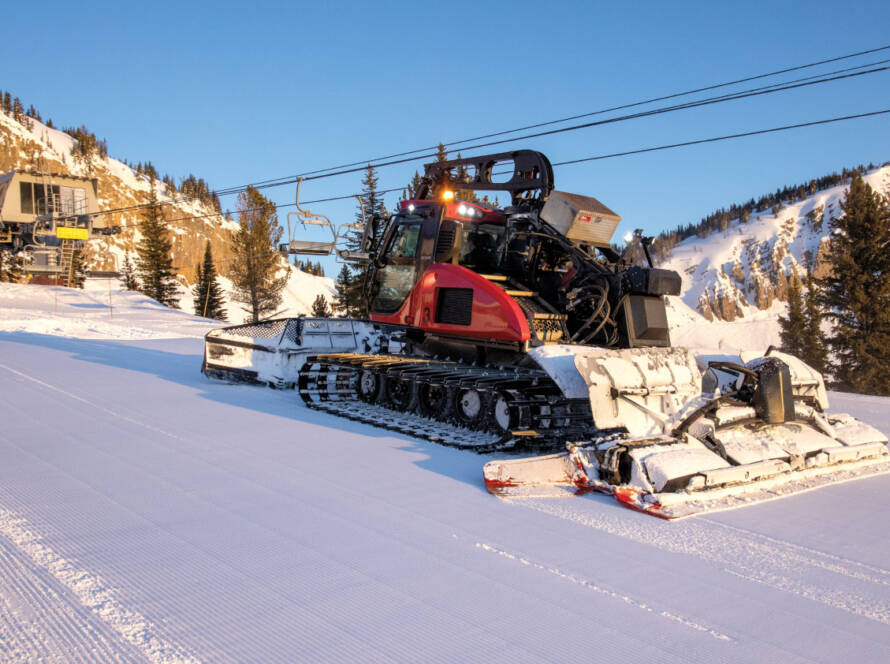If Brian Pombo had his druthers, you would likely never notice the work he and his company, All Mountain Construction, does on the slopes.
It’s not that he’s not proud of what his company has accomplished. Quite the opposite, in fact. It’s just that if Pombo and his crew do their job properly, they tend to leave little trace that they were ever there.
The Breckenridge, Colo.-based company specializes in providing excavation solutions where conventional machinery can’t reach without tearing up the environment. That might explain why more than half of the work they do is for the ski industry and why All Mountain has been involved in some of the largest upgrades and expansions at numerous ski areas across North America.
“I think that’s the big thing now. Back in the 1970s, people would take in big bulldozers and just doze whatever runs they wanted,” said Pombo, All Mountain’s president and founder. “A lot of it now is regulated by parks people and the forest service. They don’t want you leaving big scars now. They want more natural terrain compared to just leveling the mountain and pushing dirt where they want it to go.”
Pombo established All Mountain a little over a decade ago following a 12-year career as a project manager with Leitner-Poma, one of the leading manufacturers and installers of chairlift systems in the world.
It was during his tenure with Leitner-Poma that Pombo saw the challenges which came along with steep slope excavation such as building costly roads to transport equipment, benching that equipment into a hillside and then restoring the landscape when all the work was done. What if you could do that same work in a more cost-effective and environmentally-conscious way, he wondered? That question helped him realize there was room for a “niche” player in the excavation industry and inspired him to start up his own company.
Steep slope excavation
A huge chunk of the work All Mountain does is steep slope excavation that is beyond the capabilities of conventional equipment. All Mountain can safely access slopes of up to 45 degrees without the need to build costly roads or bench equipment.
How do they manage that? The key, according to Pombo, is the equipment his company deploys. One of the vital pieces of machinery All Mountain uses is a Spider all-terrain excavator manufactured by Menzi Muck that can traverse nearly any kind of terrain. It’s hydraulic “legs” operate level to any slope and can easily be controlled by the operator on any kind of terrain. It is ideally suited for tight spaces that larger machines can’t access. Paired with a Wimmer AB2300 T20 drill attachment, it can provide top hammer, down hole and injection anchor drilling.
All Mountain has also done a lot of slope stabilization and restoration work in areas where larger equipment can’t access steep slopes and the work has to be done with minimal environmental impact. One of its most recent projects in that regard was some landslide reparations and prevention work for the U.S. Department of Transportation in North Carolina.
The company also provides environmental clean-up services to a number of private companies and government agencies. It did work in that regard at the Los Alamos National Laboratory in New Mexico – the site of the Manhattan Project – and also did some recent environmental remediation on behalf of the U.S. Navy in Hawaii.
One of the most ambitious projects All Mountain has been involved in was a massive expansion of the Arapahoe Basin Ski Area in Dillon, Colo., located about 70 miles west of the city of Denver. The expansion included the addition of 468 acres of terrain and offers 34 new runs and a brand-new chairlift system.
Pombo’s company was involved throughout the two years it took to complete the project. All mountain worked closely with Leitner-Poma to excavate the soil for each of the chairlift system’s towers as well as its bottom terminal. All Mountain also did all of the site prep and grading for the system’s bottom terminal and ground most of the remaining tree stumps using a masticator or brush cutter.
No easy undertaking
As one might imagine, this project was no easy undertaking. Pombo says cement had to be flown in by helicopter and crews had to hike about four miles each day to access the site.
It wasn’t the first time Pombo has done work on behalf of Arapahoe. As a project manager with Leitner-Poma, he was involved in the ski area’s last major expansion back in 2007 when it constructed the Montezuma Bowl. Management was so impressed with the work he did then and the working relationship the two sides shared, they were anxious to have his expertise on its most recent expansion.
“We’ve had a long relationship with Brian…and we spent some time (before this project) talking with him and he really instilled confidence in us that he could do this project in a way we would like,” said Arapahoe COO Alan Henceroth.
“We really wanted to have as light an impact on the ground as possible. All the stakeholders that are associated with the ski area want us to be gentle on the land and be very sustainable. They don’t want us tearing things up. We tried to do this in such a way…that it doesn’t look like a bunch of bulldozers have been all over the place tearing everything up.
“It wasn’t an easy project. Co-ordinating what everybody was doing took a lot of work. It took a lot of communicating, a lot of patience, a lot of understanding the outcomes. Brian and his team did a great job. We were extremely happy with the work they did.”
Slow, but steady growth
Pombo says his company enjoyed slow, but steady growth over the last decade. All Mountain has grown from a one-machine operation to two, and Pombo now has a handful of employees. All of this has happened despite the fact All Mountain had done little to advertise its presence.
“A lot of it is word-of-mouth from customers we’ve worked with over the years,” Pombo said. “A lot of it comes down to reputation and recommendations. That’s the big thing; we try to keep the quality there.”
All Mountain’s reputation has been built, in part, on the company’s adherence to its environmentally-friendly principles. In addition to using machinery that creates far less ground pressure than conventional tracked equipment, it uses biodegradable Panolin hydraulic fluid and biodegradable grease in all of its excavating machines.
“We try to use earth-friendly lubricants whenever we can,” Pombo said. “The hydraulics are the big thing. You are talking about machines with 50-gallon capacity. If you spill that out in the middle of nowhere, the fact it’s biodegradable can make a huge difference.”
While there is no shortage of challenges when it comes to major excavation projects, Pombo says one of the biggest challenges for his company is planning. Most of the work they do has to be wrapped up in a short period of time, which requires intimate knowledge of the terrain and knowing which areas can be accessed and which ones can’t.
“It’s a very short season to get all the work done. That’s why planning for an expansion is such a big thing,” he said.
Continuous learning
Even though All Mountain has worked on hundreds of different terrain-based projects, Pombo says he and his crew are constantly learning new things.
“It’s always a constant learning curve with the machines because you don’t know everything about them all at once. You are always finding ways to be more efficient and be creative with the way you are moving them,” he said.
Most of the work All Mountain does in the ski industry happens during the summer months, but planning for a project often begins months or years before any ground is dug. In the case of Arapahoe Basin, preliminary discussions with the ski area’s management began nearly four years before the start of construction.
The scale of these projects makes planning “sooner rather than later” critical in order to ensure successful completion, Pombo says.
“Planning is just crucial in terms of how you are going to go about it and get supplies in, especially to remote areas,” he said. “How are you going to get in and do some of the work? And when you are in a high alpine environment, the weather can change in a heartbeat. Those remote projects are definitely a challenge…you’ve got to have all your ducks in a row.”


![[image placeholder]](https://www.snowopsmag.com/wp-content/uploads/2023/09/placeholder@2x-890x664.png)
